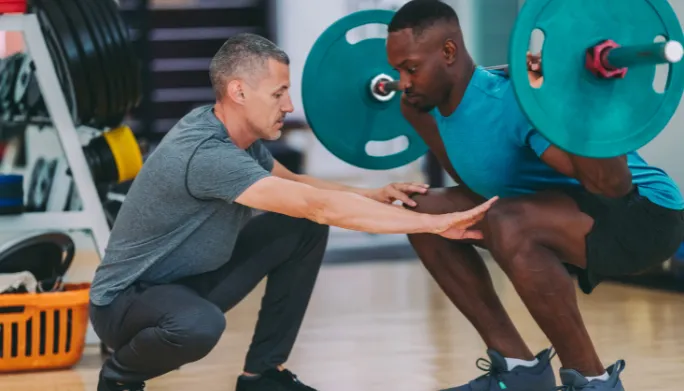Sports Conditioning In Asheville

We offer customized sports conditioning programs adjusted to specific sports and skill levels to clients who are preparing for the rigors of engaging in specific sports without incurring a high risk of injuries.
We are not only sports specific, but we are also age and experience specific as we work with clients one on one to help their build the strength they will need as well as the agility, the power and the speed to match their personal goals.
To prepare you for your sport of choice, we look at limitations in movement patterns, areas that need further attention to avoid risk of injury, and exercises to build strength and power to match the specific needs of your favorite sport.
Sports conditioning is an essential component of any athlete’s training regimen. A Physical Therapist who specializes in sports conditioning can help athletes achieve their goals by designing customized training programs that optimize their performance, minimize their risk of injury, and accelerate their recovery times.
What is Sports Conditioning?
Sports conditioning is a systematic approach to training that is designed to enhance an athlete’s performance, regardless of their sport or level of competition. It involves a combination of cardiovascular and strength training exercises, as well as flexibility and mobility drills.
A Physical Therapist who specializes in sports conditioning will work with athletes to identify their unique strengths and weaknesses, and develop a customized training program that addresses their specific needs. By tailoring the program to the individual athlete, the Physical Therapist can help them achieve their full potential, while also minimizing their risk of injury.
Benefits of Sports Conditioning
There are numerous benefits to engaging in sports conditioning, including:
Improved Performance: By targeting the specific muscle groups used in a particular sport, sports conditioning can help athletes improve their performance, increase their speed, and enhance their endurance.
Reduced Risk of Injury: Sports conditioning can also help reduce the risk of injury by strengthening the muscles and improving flexibility and mobility. By developing a strong foundation of muscle strength and flexibility, athletes are less likely to suffer from common sports injuries such as strains, sprains, and tears.
Faster Recovery Times: In the event that an athlete does suffer an injury, sports conditioning can also help speed up their recovery time. By maintaining a strong foundation of muscle strength and flexibility, the body is better equipped to heal itself more quickly.
Sports Conditioning Exercises
Sports conditioning exercises can vary depending on the sport and the athlete’s specific needs. Some common exercises include:
- Plyometrics: Plyometric exercises involve explosive movements such as jumping and bounding, which can help improve an athlete’s speed and power.
- Strength Training: Strength training exercises such as weight lifting and resistance band training can help increase muscle strength and endurance.
- Flexibility and Mobility Drills: Flexibility and mobility drills such as stretching and foam rolling can help improve joint mobility and reduce the risk of injury.
- Cardiovascular Training: Cardiovascular training such as running, cycling, or swimming can help improve an athlete’s endurance and overall cardiovascular health.
How a Physical Therapist can Help with Sports Conditioning
A Physical Therapist who specializes in sports conditioning can help athletes achieve their goals in a number of ways, including:
Assessing Strengths and Weaknesses: A Physical Therapist can conduct a thorough evaluation of an athlete’s strengths and weaknesses, including an assessment of their range of motion, muscle strength, and flexibility. Based on this assessment, the Physical Therapist can develop a customized training program that addresses the athlete’s specific needs.
Designing a Customized Training Program: A Physical Therapist can design a customized training program that includes a variety of exercises and drills tailored to the athlete’s sport and individual needs. This program can help improve performance, reduce the risk of injury, and speed up recovery times.
Monitoring Progress: A Physical Therapist can monitor an athlete’s progress over time, adjusting the training program as necessary to ensure that the athlete is making progress towards their goals.
Providing Injury Prevention Strategies: A Physical Therapist can also provide athletes with injury prevention strategies such as proper warm-up and cool-down routines, as well as recommendations for proper nutrition and hydration.
Get the support you need.
Sports conditioning is a crucial component of any athlete’s training regimen. A Physical Therapist who specializes in sports conditioning can help athletes achieve their full potential by designing a customized training program that addresses their specific needs. By incorporating a variety



